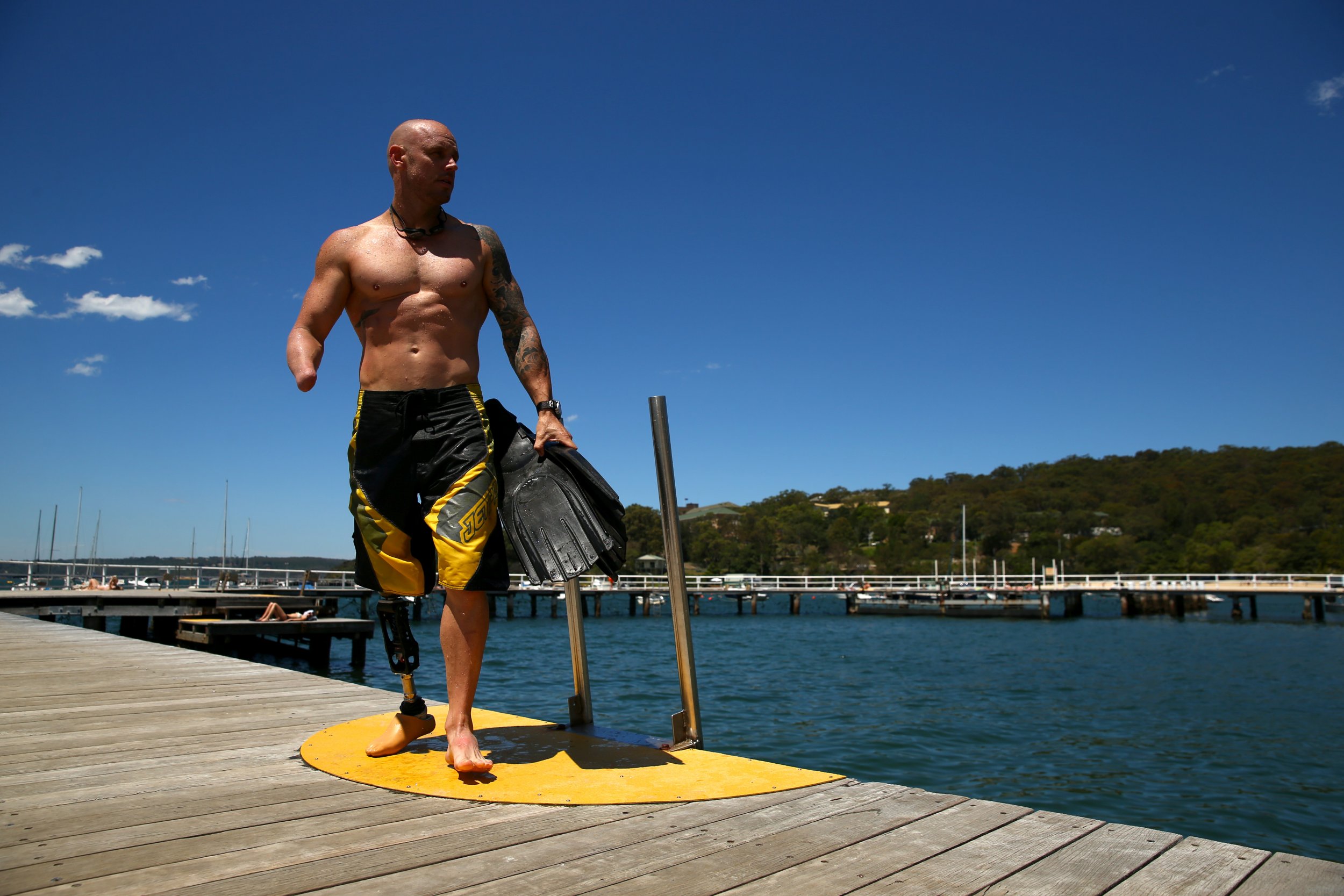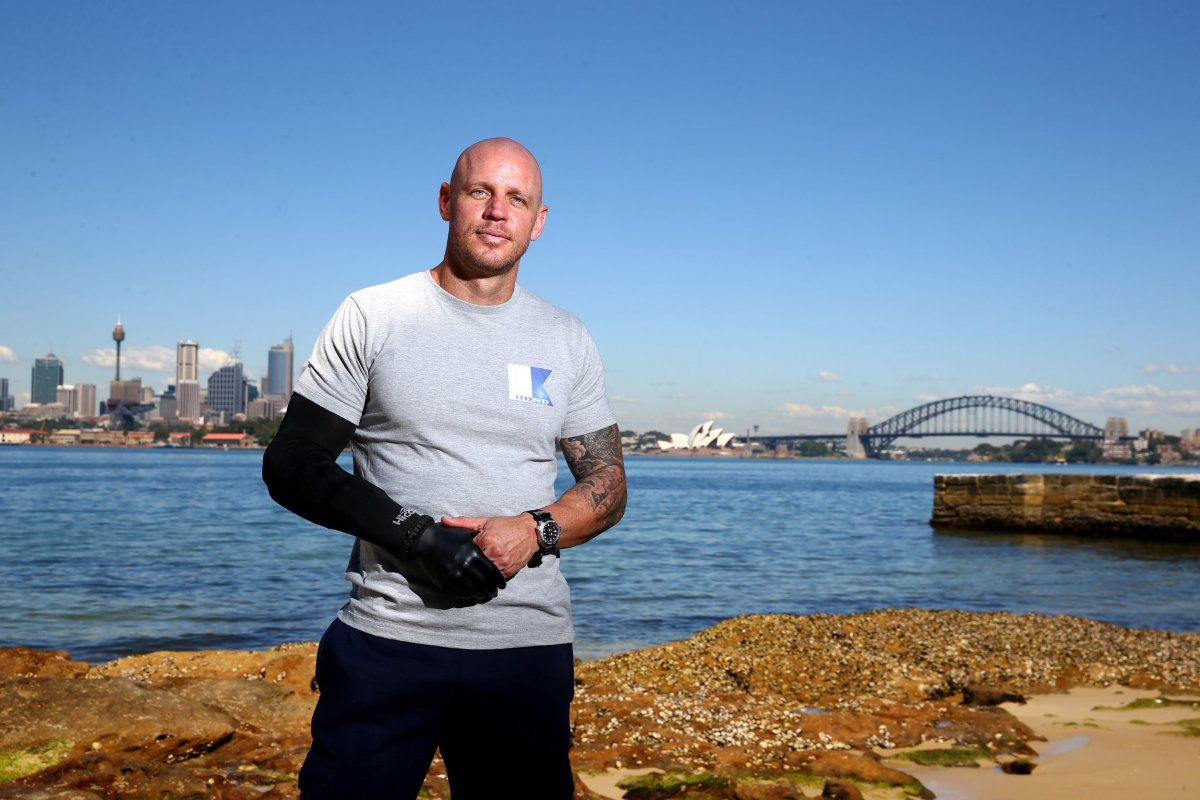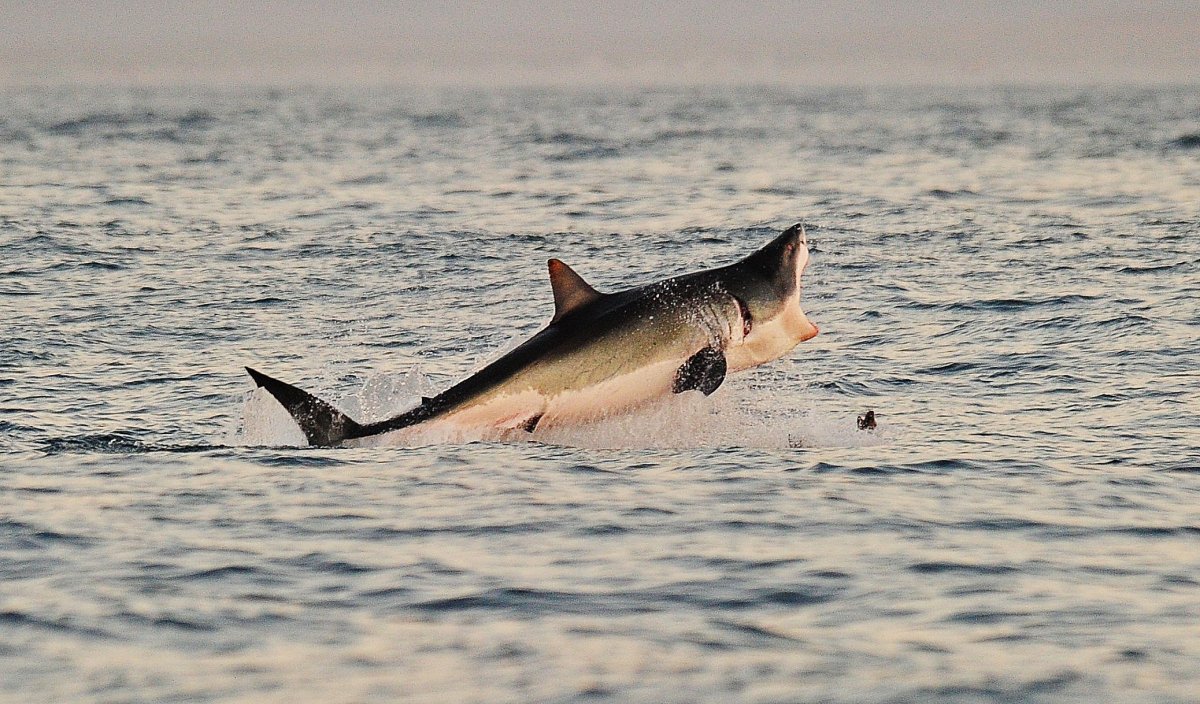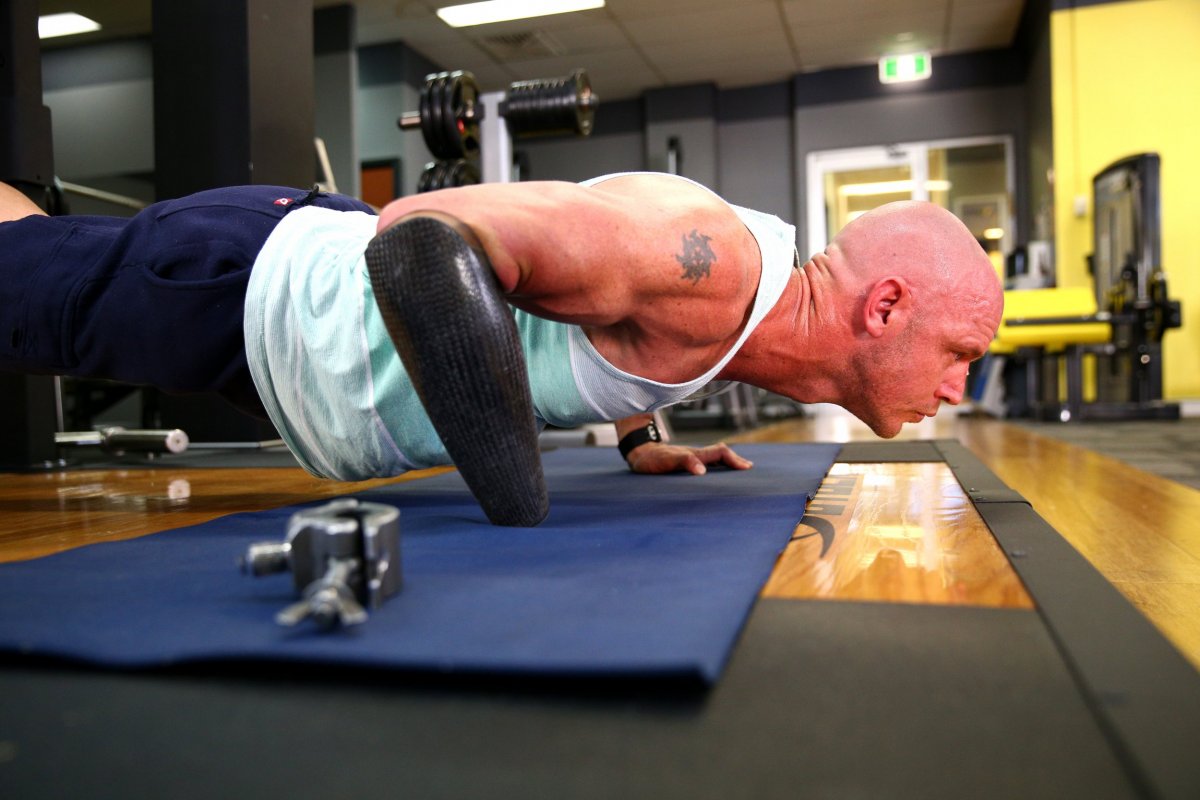
Wearing a wetsuit and fins, Paul de Gelder rolled over the edge of a dinghy and into the cold water of Sydney Harbor. It was an unseasonably chilly morning in February 2009, and as he turned onto his back and started kicking, he glimpsed the famous Sydney Harbor bridge and opera house in the distance. Above him, the sky was gray. As a clearance diver with the Australian Navy, de Gelder, then 30, had clocked at least 500 hours in dives, doing everything from tactical operations, to disarming mines and explosives, to repairing battle damage to ships, ports and anything under water. (Think: The Hurt Locker meets Men of Honor meets Aussies.) But each time he slipped beneath the surface, he supressed a terrible fear: sharks.
That day, he and three other divers were in the midst of a counterterrorism exercise for the military, testing an unmanned video and sonar device by swimming from one point to another to see if the device could detect their presence. The new guy on the team had just spent the first half hour in the water. "That's how it works; he's the new guy," says de Gelder, who's now 40 and lives in Los Angeles. "But I thought, I'll take over."
Four or five minutes after de Gelder splashed into the water, he felt a strong WHACK in the back of his right leg. He turned around and came face-to-face with a giant bull shark's head, its teeth sunk into the flesh of his leg, it's lips pulled back to reveal glistening pink gums, it's big black eye staring back at him. "Your brain takes a second or two to make sense of what you're seeing," he says. "Then I realize, there's a fucking shark and it wants to eat me and it's attached to my leg!"
He tried to jab it in the eye, but as soon as he moved his right arm, he realized that his wrist and hand were ensnared in the shark's mouth, too. He flung his left arm across his body, aiming for the shark's eye, but he couldn't reach. "I was four inches short!" he says. So he pummeled the animal in the head. "Just as my hand comes in to punch its nose, the shark starts shaking me. It's top jaw goes one way and bottom jaw goes the other way, so its teeth act as a double-sided saw. That's when the pain got really bad," de Gelder says. "All the fight went out of me. I was in absolute agony."
Suddenly, the bull shark pulled de Gelder under. He choked as his lungs filled with water. "After a few seconds, I thought to myself, 'You're gonna die right now,'" he says. "Everything slowed down. I thought, 'I've lived 10 lifetimes in these last 31 years. If it's my time to go now, I'm ready.'"
'I Wanted An Amazing, Incredible Life'
There has never been a time in de Gelder's life when he wasn't running into or away from catastrophe. "When I was seven, I got my nose bitten off by a dog. I spent a few days in hospital getting it sewn back together and that set the scene for the rest of my life," he says. Growing up in Canberra, the capital of Australia, he tuned out his classes at his strict, all-boys Catholic school and spent his teenage years chasing girls, shoplifting, fighting, drinking and smoking marijuana. He also cut himself. "I slashed up my arms because it felt like the only sense of control I had."
His father, a police officer, traveled a lot for work, and his mother was busy raising his two younger brothers and younger sister. That left de Gelder with virtually no guidance or oversight. He earned pocket money washing dishes or working at bars, and rarely thought about his future. "All I knew was, you can be a doctor, a lawyer or an accountant—and I didn't want to do those things. I wanted an amazing, incredible life, and I knew there was something out there for me, but I didn't know how to get there."
At 20, he went to a going away party for a buddy who was being deported for multiple criminal convictions and wound up getting beaten up by a pack of guys. Back at home later that night, he stared at himself in the mirror—at his black eye, his cut lip, his bruises. "I thought, 'Is this the sort of life I want?'" he says. "I knew something had to change or I'd be dead or in jail by 23."
So he packed up all his belongings in a small gray Suzuki ("I didn't even have a license for it") and drove 12 hours north to Brisbane, where a buddy had gotten him a job tending bar at a strip club. "All my new best friends were hot strippers!" he says. "I saw another side of life. Really odd people go into strip clubs in the middle of the day. But it wasn't a very healthy environment." He worked 12-hour shifts in the dingy bar, smoking cigarettes and drinking and pulling in only $500 a week.
In his free time, he started making music with two buddies who ran a radio show. He'd grown up on Ice-T, N.W.A. and Run-D.M.C., and wrote a rap song that the group, called Flavors Radio Show, featured on their EP. "We opened a Snoop Dogg concert! I thought, This is it, I'm gonna be rapper. This is what I was looking for!" he says. "But there wasn't a lot of money for white rappers in Brisbane in 1998."

The group broke up and de Gelder found himself aimless yet again. He was broke, so he got a job working at a restaurant and moved into a house without electricity or running water, where he slept on two couch pillows, bathed at the local pool and ate ramen noodles for most meals. A year passed. He started saving again. "But there was this thing gnawing away at me," he says. "I was talking to my boss at the restaurant and said, 'I'm thinking of joining the Army.' He said, 'Don't! The pay is terrible, the hours are terrible.' He offered to give me the bar manager's job."
De Gelder, then 22, remembers looking over at the current bar manager, a skinny, pale guy sitting there smoking a cigarette. "I thought, I don't want to be that guy."
In November 2000, he joined the Army. At basic training, he says he spent 10 weeks marching, exercising, practicing hospital corners and getting yelled at. "You're going on autopilot because you're too scared to think. I really struggled with it, but I knew that if I kept making the same decisions, nothing would change. Instead of fighting against the discipline, I tried to change the way I looked at the situation"
That mentality paid off. At the end of training, he earned his platoon's physical training award. His next stop was infantry school, then paratrooper training. "When I got that maroon beret, the symbol of paratroopers around the world, I had such an amazing sense of pride," he says. "It changed the whole way I thought about my world and the things I could achieve."
De Gelder rappelled out of black helicopters, patroled borders through dense jungle, and helped the UN's peacekeeping efforts in East Timor. Eventually, he grew tired of it. "I didn't want to be in the bush digging holes, sleeping in holes, pooping in holes. My work ethic started to slip, and I didn't want that to happen" he says. "I wanted to be fulfilled." He'd recently met a naval clearance diver. "I knew they were a little bit special," de Gelder says. "We talk about them in whispers. I thought, why can't I be one of those guys?"
In April 2005, five years after joining the Army, he left for the Navy. After learning how to scuba dive and search for bombs underwater, he endured the Clearance Diver Acceptance Test, which de Gelder calls "10 days of mental, emotional and physical anguish." He'd swim across Sydney Harbor in the middle of the night, and after sleeping a couple of hours, he'd have to wake up and run a half marathon, followed by five hours of physical training on sand dunes. "There were breath hold dives, mind games—it goes on and on. They try to break you to see who has the heart to be there," he says. "For me, it was hard, but it wasn't even a choice."
When de Gelder learned he'd passed the test with an A, he teared up. "I'm thinking, How the hell did I pull this off?" he says. He spent the next four years working as a naval clearance diver. "It was so rewarding to know I was doing something special that most other people can't do. I grew up wondering, 'What is the thing I'll have in my life that I don't know yet?' I thought I'd found it."
'Nothing Left to be Afraid of'
Everything changed for him on that chilly February morning in 2009. It was a particularly dangerous year for shark attacks in Australian waters. Twenty-two people were victims of unprovoked attacks, according to the International Shark Attack File, compared with 15 last year, 18 in 2015, and an average of 13.2 per year between 2011 and 2015. Yet deaths from shark attacks are rare. And while sharks are common in Sydney Harbor, attacks are not. It had been 60 years since someone had been attacked by a shark in those waters—until de Gelder slid off that dinghy and into the mouth of a vicious bull shark.

The attack lasted 10 agonizing seconds. Suddenly, he felt his body pop up to the surface. The shark's tail thrashed a violent spray of water in his face, and when he realized he wasn't dead, he started swimming for his life through a pool of his own blood. About 15 seconds later, his team hauled him into the dinghy and sped off. (The unmanned video and sonar device that de Gelder was supposed to be testing captured the entire encounter on video.)
By the time they reached the pier, de Gelder was barely alive. All that was left of his right hand was one finger and a bunch of mangled tendons. The shark had bitten off his right hamstring, including seven or eight inches of his sciatic nerve, and so much blood was gushing from his body that one of his buddies had to stick his fingers inside his thigh and pinch an artery until the paramedics arrived.
"They have a strict protocol: no more than 5 milligrams of morphine in the first 20 minutes," de Gelder says. "Later, I learned they gave me four times that amount in the first five minutes. I was in a lot of pain by that stage… I was begging the paramedics for more drugs."
At the hospital, doctors amputated what was left of de Gelder's right hand. They spent a week trying to save his leg, but he'd never be able to move it or even feel it again. "The doctor said, 'Your leg could catch fire and you'll never know!'" de Gelder says. "I was so high on morphine and ketamine, I said, in all seriousness, 'Take my leg and turn me into a Terminator.' The doctor gave me a day to think about it but I didn't need that long. I didn't want this unfeeling, unmoving lump. I wanted to get on with life."
De Gelder spent nine weeks in the hospital and another six months recovering. "I remember lying in the hospital bed thinking, What do I do now?" he says. "I'd fought tooth and nail to make my life amazing from what it was. I'll be damned if I go back to that life before. I realized that was the only power I had: I might be laying in a hospital bed dripped up on drugs, and I can't go to the toilet by myself, but I have the power to make a choice."

Armed with a prosthetic hand and leg, he started teaching at the Navy's diving school. It was supposed to be a part-time gig, but he threw himself into the role, working 70 and 80 hour weeks for the next three years. "I wanted to prove I could be there and do the job," he says. "It was at times extremely fulfilling to show the guts of what it takes to be a clearance diver to trainees, but it was killing me."
Physically and emotionally exhausted, he left the Navy in 2012 and decided to become a motivational speaker. At first he was terrified. "Speaking was way scarier than bombs and sharks," he says. His attack had been big news in Australia and he'd made the rounds on every major television talk show in the country, but as he puts it, "How long can you remain the flavor of the month?"
Years, apparently.
In 2012, he appeared on Discovery Channel's late-night talk show Shark After Dark. Since then, he's co-hosted three documentaries for Shark Week and, this week, will appear in three Shark Week specials that take him across Australian waters, from diving with great whites to watching what happens when 14-foot crocodiles slither into shark territory. He's also traveled around the world telling his story and educating people about sharks and conservation. "I've had 52 people pass out, and 50 of them are men," he says. "And it's just from me talking about the surgery and showing some of the photos… I did a launch for Microsoft a couple years back and had six people pass out in one go. They said it was the best conference they'd ever had."
De Gelder has spent his life chasing that childhood dream of an "amazing, incredible life," and he's defied the odds at every turn, whether it was running from a troubled childhood to join the Army, or leaving the Army to join the Navy, or choosing to live life again after two limbs in a gory shark attack. Perhaps his greatest feat since that grisly morning was choosing to swim with bull sharks again.
A few years, ago, 60 Minutes Australia set up a dive for de Gelder in Fiji, and as he descended 100 feet beneath the surface, he felt an extraordinary sense of calm. Everything slowed down. Plantlife danced around him. Schools of fish swarmed. And then dozens of sharks appeared, including bull sharks. De Gelder reached into a bucket of fish heads, pulled one out and dangled it out in front of him. A moment later, a bull shark charged at him, snapped the fish out of his left hand, then swam away.
"It was incredible, he says. "It opened my eyes to the fact that these animals aren't trying to kill us. They're not malicious. They're just sharks doing sharky shit… When you come that close to death, you realize there's nothing left to be afraid of."
Uncommon Knowledge
Newsweek is committed to challenging conventional wisdom and finding connections in the search for common ground.
Newsweek is committed to challenging conventional wisdom and finding connections in the search for common ground.
About the writer
Abigail Jones is an award-winning journalist and New York Times bestselling author. Her Newsweek cover story, “Life After Eleven Years ... Read more
To read how Newsweek uses AI as a newsroom tool, Click here.








